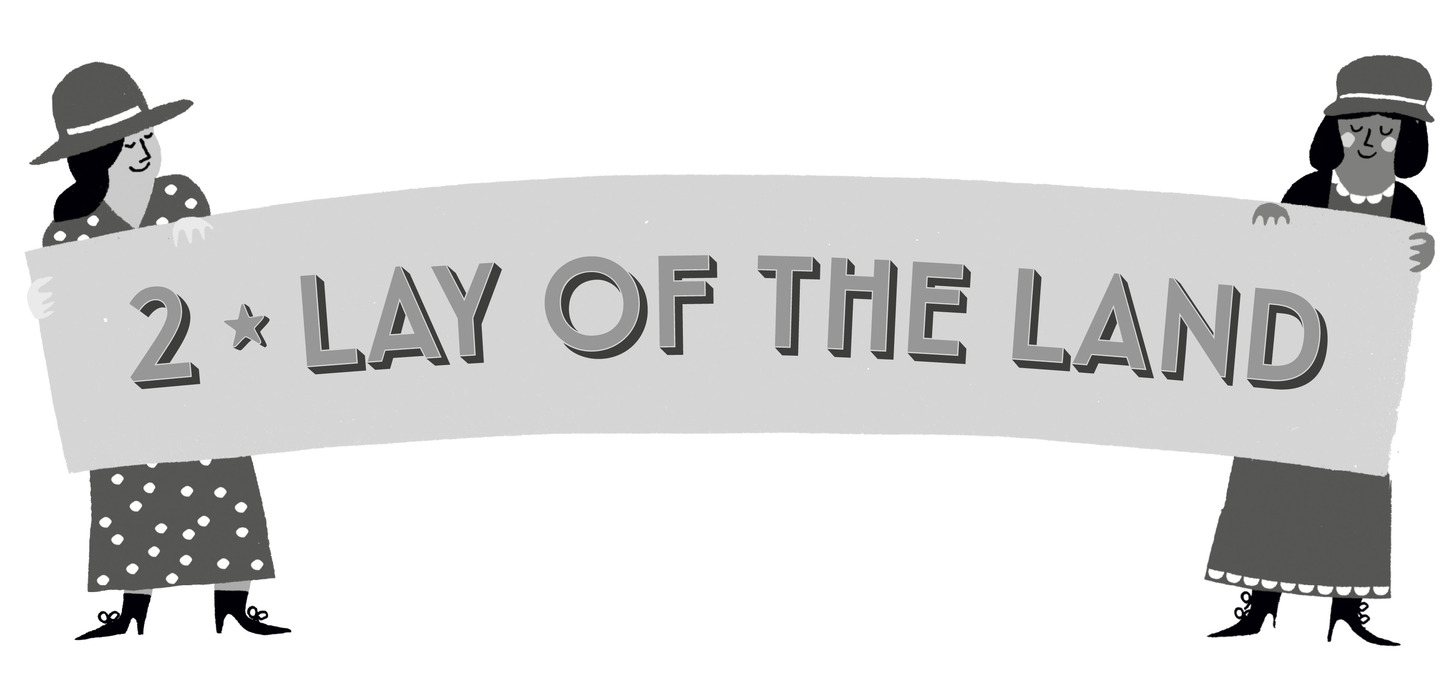
Bright sunshine beat down on Nashville the next morning. The city was Sunday quiet and groggy with heat. Stores on Church Street stood locked under rolled-up awnings. It was the Sabbath. But today was no day of rest for Carrie Catt. A busy afternoon lay ahead. Over a hundred of the city’s most powerful people would be coming to meet her at her hotel room in the Hotel Hermitage.
In her third-floor room, Carrie clipped her pince-nez eyeglasses onto her lacy blouse. With her usual calm confidence, she took a deep breath and brushed aside the window curtain to peek onto the street. Sure, Nashville was going to be hard work, but she was never a woman to shrink from a challenge.
Even as a teenager, she’d refused to allow anyone to underestimate her abilities or stifle her ambitions. She’d yearned to go to college and study for a career like her brother would, but her father had tried to shoot down her dreams. Women didn’t need so much education, he said, and anyhow, the family couldn’t afford it.
That hadn’t stopped Carrie. She’d found a job teaching and saved up enough money to put herself through Iowa Agricultural College, washing dishes and stamping library books to pay tuition. In school she’d been a trailblazer. She’d aced her classes and started a women’s debate club. When she was excluded from “boys’ ” activities, she found ways to pursue those interests anyway, on her own terms. She didn’t want to live in a world where men made all the rules. She wanted to create her own successes. Tall, dark-haired, and silver-tongued, she had set her sights high. She wanted to become a lawyer but couldn’t afford law school on her own. So she worked many different jobs—everything from a newspaper editor to a high school principal—to save up for it.
Carrie also started working as a field organizer for the Iowa Woman Suffrage Association. Ever since that unforgettable morning in her family’s kitchen, she’d felt passionately about a woman’s right to vote. She just hadn’t intended to make a career of it—she didn’t even realize that was an option. But once Carrie got involved in the suffrage association, there was no stopping her. It didn’t take long for the older, more experienced suffragists to take notice. They quickly recognized her magnetic speaking skills, her innate ability to get a crowd excited about a common goal. Everyone could see that this Iowa girl had the fire to carry the Cause into the twentieth century.

In 1900, Susan B. Anthony had chosen Carrie to be the next president of the National American Woman Suffrage Association. That was twenty years ago, and here she was in Nashville, Tennessee, still fighting.
A knock at Carrie’s hotel room door startled her for a second. She leapt up to greet Catherine Kenny.
Carrie had been looking forward to her conversation with Catherine. Catherine knew the lay of the Tennessee land like the back of her hand. It was she who’d organized the meet and greets for Carrie today. They had much to go over before their guests’ arrival.
Catherine Kenny radiated optimism, but she never underestimated the challenges suffragists faced, especially in Tennessee. It took a whole lot of courage to be a Suff in her home state, she knew. It wasn’t exactly considered a “respectable” calling. You had to grow a thick skin, and you had to learn to ignore (or laugh off) whatever people said about you. Catherine always made the suffrage movement seem enticing and fun, though, and her enthusiasm was contagious. Women who got to talking to her soon found themselves joining suffrage clubs.
Catherine was relieved that Carrie Catt—protégé of Susan B. Anthony herself!—had come all the way from New York to help Tennesseans. Really, they needed all the help they could get.
Catherine removed her hat and smoothed her dress before handing Carrie her reports. She’d gone over them herself that morning. The results of the first poll of the Tennessee legislature weren’t exactly promising. Carrie studied them carefully. The suffragists had asked Tennessee delegates across the state whether they’d ratify the amendment for woman’s suffrage. So far, only one-third of the men had responded positively. That wasn’t much. Many delegates hadn’t even bothered to reply. Some flat-out refused to ratify. Others said they’d support the amendment—they just weren’t quite ready to be placed on the definite “Yes” list.

Polls record which politicians, or which constituents, support which issues.

Catherine couldn’t understand why these men were taking so long. This was urgent!
The previous year, Tennessee had passed a limited suffrage bill, giving women the vote in municipal and presidential elections. Women still had no say in choosing their congressmen or senators, but it was certainly better than nothing. Catherine had been so proud the day the bill was passed. Then she’d worked with Nashville’s black suffragists to register black women and get out the vote. It made her proud to be a Tennessean. The women of Tennessee—and of the entire United States of America—were one step closer to full suffrage.
Carrie admired Catherine Kenny’s political instincts and clever footwork, but the poll made her anxious. Not nearly enough legislators had agreed to support the Nineteenth Amendment, and there was no excuse for silencing the voices of half the population!
She wore a sunny smile to cloak her worry, though. It was always best to put on a strong front, Carrie thought.
Soon enough, a parade of visitors began knocking on her door, welcoming her to Tennessee. Dozens followed: district chairwomen of the new Tennessee League of Women Voters; Democratic Party ward chairmen; local politicians and newspaper editors who had bravely stood up for woman’s suffrage for years. They all lined up to shake the hand of the Chief. Tennessee could do it, they said. It could really be the thirty-sixth state! If only she would lead them.

The Tennessee League of Women Voters was founded in the spring of 1920, soon after Tennessee women were granted limited suffrage in 1919.

The stream of guests continued as the sun slid down in the darkening blue sky.
It was one thing to talk to these friends of suffrage, Carrie thought as the last visitor waved good-bye. Now on to its foes.
Josephine Pearson was reading through a stack of telegrams that Sunday morning when the phone rang. Her friend Queenie Washington had arrived at the Hotel Hermitage to greet her, with a crew of Tennessee Antis in tow. Josephine couldn’t wait to be reunited with them.
On the seventh floor of the Hermitage, she and Queenie got down to business writing to-do lists and handing out tasks to their peers. They started planning rallies, dinner parties, and teas. Anything to get the anti-ratification word out there.
Josephine had been the president of the Tennessee State Association Opposed to Woman Suffrage since 1917, leading her fellow Antis in the fight against gender equality. The prominent lawyer John Vertrees had offered her the job. Vertrees—the man she considered her mentor—was a member of the American Constitutional League, the men’s wing of the Antis. His 1916 manifesto, To the Men of Tennessee on Female Suffrage, made his hostility to woman’s suffrage crystal clear.
Women were irrational and less intellectual than men, John Vertrees argued. They were too emotional to vote on policy matters, anyway. And besides, he added, their physical weaknesses, like pregnancy and periods, made them totally unfit for office.
John Vertrees’s manifesto also included a twist: if women could vote, they would be torn from their role as homemakers and plunged into the dirty world of politics—the whole order of southern society would be destroyed! Furthermore, equal suffrage would place black women on the same level as white women, and that was not acceptable. John Vertrees was convinced that African Americans were inferior purely based on the color of their skin. The idea of racial equality disgusted him.
The South’s social order had already been torn apart fifty years ago, first by the Civil War, then by Reconstruction. The ghosts of the war still haunted the southern states.
Then, a year ago, in 1919, the suffragists had pressed for limited suffrage rights. The legislature had eventually given in to their demands. It had been a humiliating defeat for the Antis. Women—both white and black—had been at the polls during last fall’s elections. No way were the Antis going to let that happen again.
Josephine agreed with John Vertrees on all counts. She wanted to do him proud. And now every Anti woman in Tennessee was going to spread the message: woman’s suffrage wasn’t welcome in their state. Charlotte Rowe, the Antis’ fiercest spokeswoman, was already on her way to Nashville from Anti headquarters in New York City. Two former-suffragists-turned-Antis, Kate Gordon and Laura Clay, were bringing their inside knowledge of Carrie Catt and those NAWSA Suffs. They’d already been so helpful in putting a stop to ratification throughout the South.
World War I had changed things for women, and not for the better, Josephine was convinced. While men were off fighting, women had taken up men’s work. They’d gone off to the coal mines, to the fields, and into the streetcars. They’d even donned men’s clothes.
The worst part of it was—these “modern women” actually liked it! Some of them wanted to stay put at their new jobs, even after the men had returned from war. Josephine couldn’t understand it. How could these women choose to drive a truck, or toil away in a factory or an office? How could they think they were strong enough to labor like men? Being homemakers, raising children, and giving men support: those were their God-given duties. Anything else was simply unladylike. Feminism was going to destroy civilization, Josephine just knew it.
Take these suffragists right here in Nashville. They were scandalous! Especially those young ones in short skirts, their legs bare, their corsets thrown away, their hair short and boyish. It was disgusting! It was dangerous. It frightened her.
And that Carrie Catt was the very worst of them, Josephine and Queenie agreed with a sneer. Mrs. Catt was the symbol of all that was evil, ungodly, and un-American: a vile, feminist Yankee.